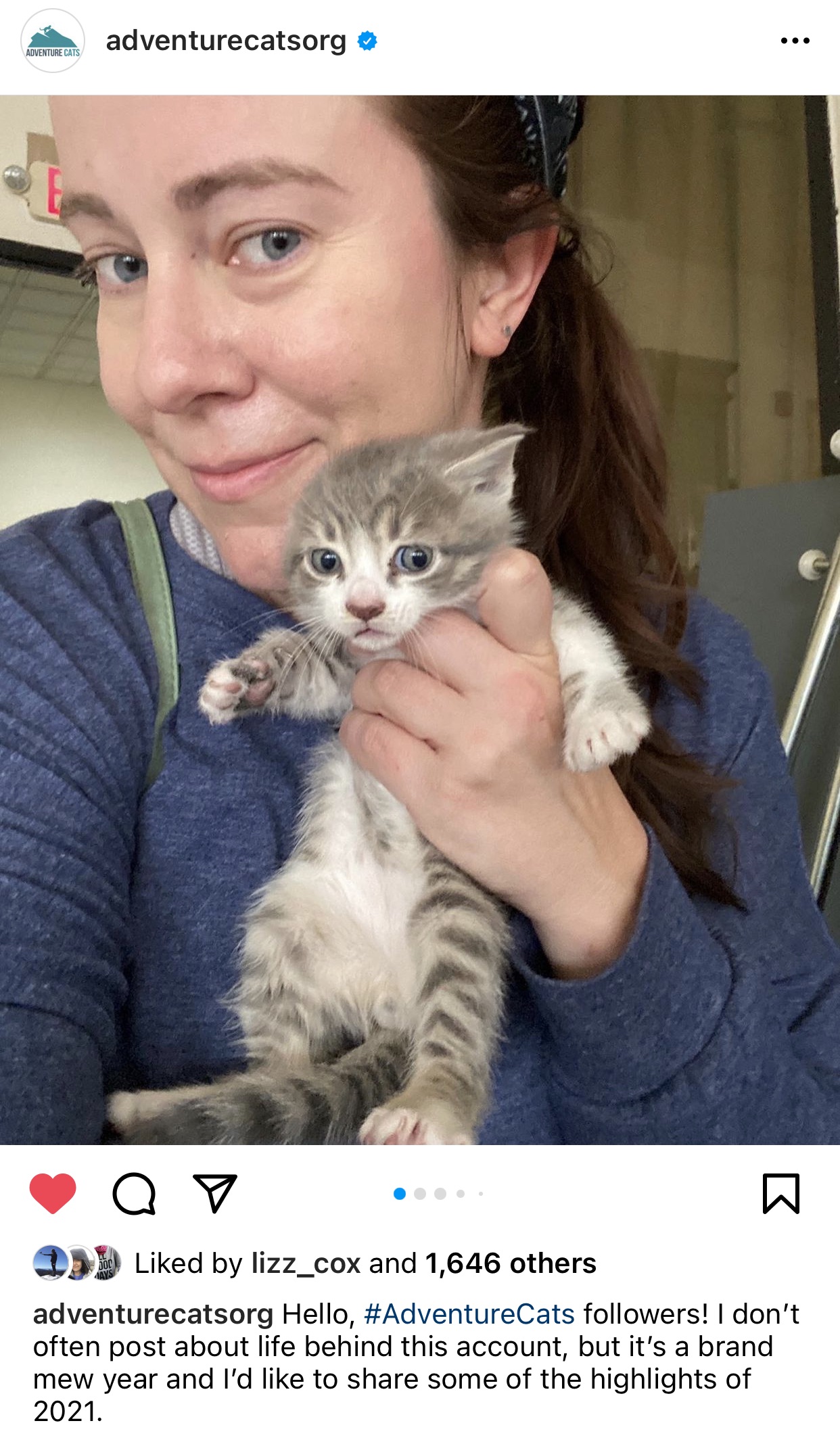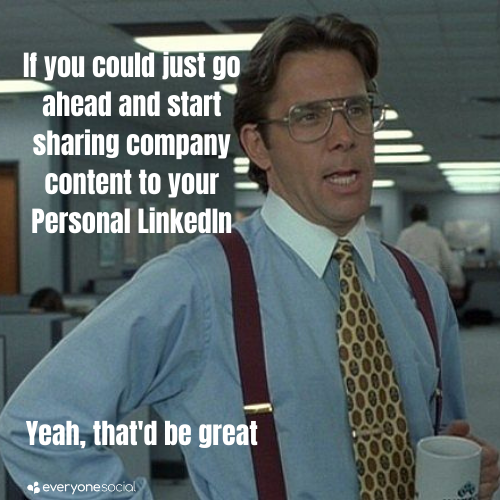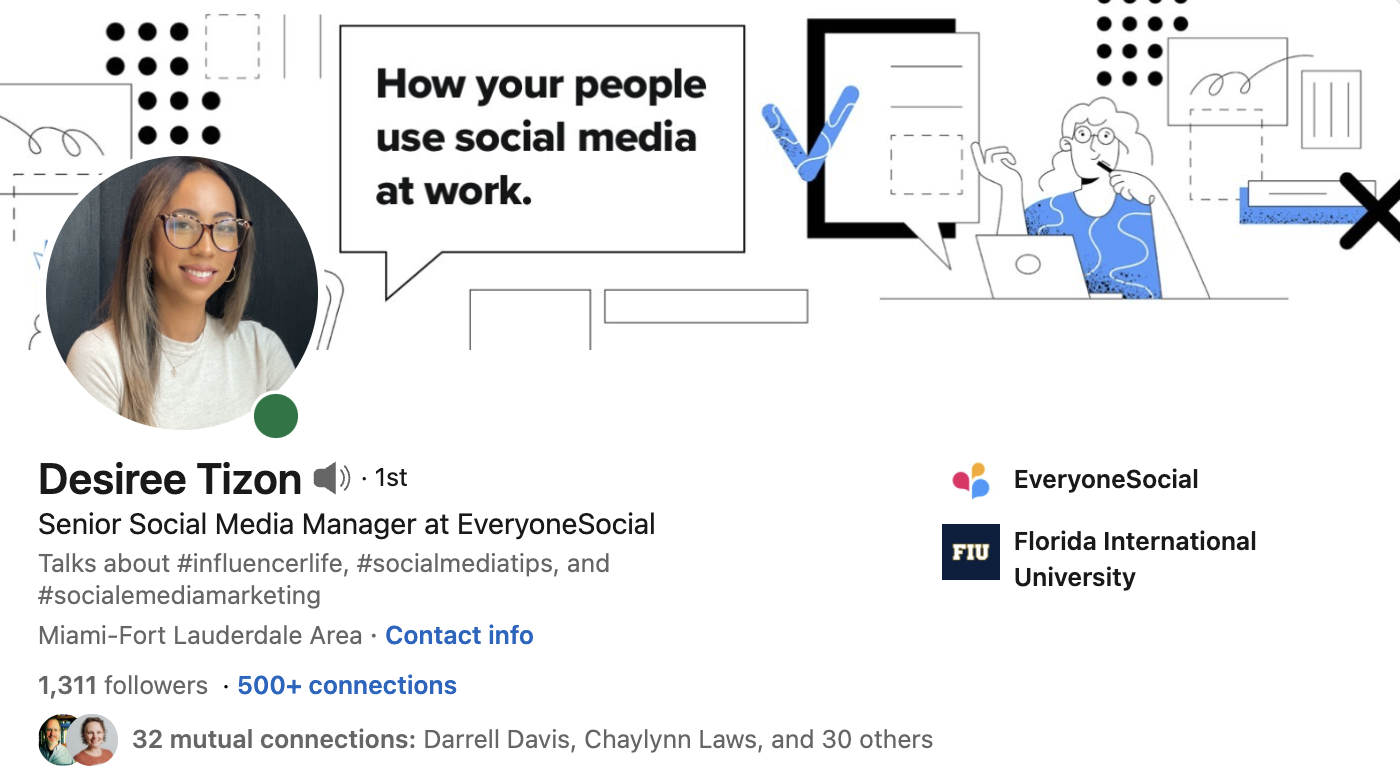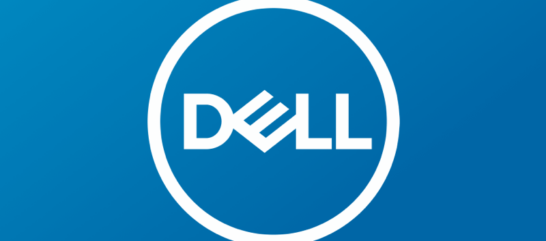The power of a strong personal brand has been understood for years.
Yet, with social media platforms and more people — and brands — seeing the benefits, personal branding went from a “nice thing to have” to an absolute game changer that some consider essential.
That’s also why leveraging personal branding at work has become a powerful strategy for many organizations. (Which hopefully means they want to be supportive of employee personal brands as well).
But where do you, as an individual, start with personal branding? And how can organizations better support employees’ personal brands while also driving company ROI?
I’ll answer these questions and more below.
What Is Personal Branding?
Your personal brand is how you represent and promote yourself to others. It’s the way you show your experiences, skills, and personality to the world. And by telling your story and expertise, you can build professional relationships and new career opportunities for yourself.
A personal brand image is built over time, based on the content you create or share online, and how you interact with other users. It influences how people view you and how the media might represent you.
Everyone can have a personal brand — and you don’t need thousands of followers or to be a regular in the media to have one.
You might develop your personal brand organically over time, or you may put yourself in the control seat and put concerted effort into defining it.

Why Would You Want a Personal Brand?
Naturally, not everyone cares about their personal brand or wants to put much effort into it.
That’s totally okay!
It can be hard work, and you may be understandably uncomfortable about putting yourself out there. After all, social media can be scary. There are a lot of people online with a lot of different opinions — and some aren’t exactly kind about expressing theirs.
Despite the intimidation factor, it’s important to work on your personal brand in some capacity, because it helps you professionally. A strong personal brand makes it easier to find great work opportunities, and helps you build your own business or side hustle.
For example, our manager of content marketing, Laura Moss, has built a “purrsonal” brand around her feline “expurrtise” and amassed 163,000 Instagram followers for her business, Adventure Cats.

Plus, developing a personal brand allows you to control your own narrative and build trust among people that could have a positive impact on you professionally.
Why is Personal Branding Important at Work?
Do you recall the early days of social media and work policies around these platforms?
If not, let’s put it this way: If you weren’t in marketing, you could be reprimanded or even fired just for using social media at work.
Fast forward to today, and more companies actually encourage their employees to use social media at work. They want their people to have a voice, communicate with their personal networks, and hopefully advocate for the brand in the process.

So whether you want to build your own personal brand or want to develop a strategy for leveraging employees’ personal brands at your organization — or both — you’ll find all the important reasons to utilize personal branding below.
Benefits For Individuals (You!)
- Improves your knowledge
- Initiates valuable conversations
- Builds trusted online professional relationships
- Creates new career opportunities
- Expands professional development opportunities
- Increases your perceived value
- Establishes you as an expert in your field
I don’t have a massive personal brand — just over 3,200 connections on LinkedIn — but I do make an effort to maintain my brand and expand my network. I post three to four times per week, sharing a mix of content about marketing, personal interests, my industry, and EveryoneSocial itself.
I commit only 15 minutes of my day to this.
But by making this minimal effort, I’ve increased my profile views, grown my followers, developed new professional relationships, opened myself up to new job opportunities, and been invited to appear on a podcast.
Not bad for just a few minutes of my time.
Benefits For Companies (Your Work!)
Personal branding at work is about utilizing a strategy that markets your people and their careers as brands. This is an ongoing effort that not only supports employees, but also helps your organization drive awareness, nurture employees, and maintain a top-notch reputation.
When employees have strong personal brands, it creates a new channel for your organization to generate real authentic ROI. Many times, that can happen indirectly, even if employees aren’t always talking about your brand online.
Our senior social media manager, Desiree Tizon, for example, doesn’t post exclusively about EveryoneSocial. But she shares company content alongside her own insights about social media marketing and her life as an Instagram influencer, which has helped her build a strong personal brand on LinkedIn.

How exactly do your employees’ personal brands positively impact the company? They contribute to the following:
- More brand awareness
- Higher-quality leads
- Increased brand trust
- Greater earned media value
- Reduced paid media spend
- Increased pipeline and more deals won
- Better brand positioning that helps the company stand out from the competition
- Improved employer brand
- Stronger recruitment pipeline
- Higher employee engagement
Example:
Let’s take a look at two EveryoneSocial customers as an example. They’re both mid-market customers that utilize our platform for employee content sharing, and they each generated more than 30,000 additional clicks to their company websites in 2021 with 50-100 employee influencers.
That’s direct influence to the company, that doesn’t even count the impressions and all the other personal content these employees shared.
When employees create and share content, or engage with others online, their audiences become more aware of your brand as a result. Plus, their networks gain trust not only in the employee, but also in your company by association.
These audiences might not be ready to buy or take immediate action just yet (some might be social media lurkers), but you can bet they’re taking notice of your company, checking out its social channels, and maybe even giving your company a follow or engaging with its content.
Additionally, they gain interest in your product or service, and they may begin researching your brand and asking their colleagues about your company. They may even realize that your organization is one where they want to work themselves.
How Do You Build Your Personal Brand at Work?
Like I said before, you don’t need thousands of followers to have a personal brand — everyone can have influence on their networks and their own professional goals, whether they have 100 followers or 100,000.
The first thing to keep in mind as you develop your personal brand though is that you can’t let it get in the way of the work you were hired to do.
Great companies will support and nurture your personal brand endeavors, but this isn’t a time to take advantage of their support and let your actual work fall to the wayside. While that should seem obvious, it’s important to call out.
A few steps for you to get started with your personal brand:
- Define your skills and expertise. Are you known for marketing? Sales? Building businesses? Engineering? Do you have specific skills in those areas you can share? Like results, learnings, mistakes, etc.
- Determine what you’d want to be known for. What makes you stand out now, and where do you want to go in the future?
- Understand the audience that your expertise would interest and who you want your network to be. If you’re a social media marketer, for example, you’ll want to start connecting with others in that industry and field.
- Research your industry and follow the experts. Who already has strong personal brands and influence in your space? Follow, connect, and engage with them.
See if your company has a social-sharing platform in place to streamline this process and get involved.
Don’t have a platform already? Start using EveryoneSocial for FREE and show your company how it can benefit the organization.
Or you can start to manually build out your own individual process until your company catches on to the power of employee personal brands. Unfortunately, not every organization is willing to embrace social media at work and personal branding right away.
How Can Companies Support Employee Personal Brands?
More organizations are aware of the power of employee influencers and the value of their voices; today any employee with a social network can be an influencer.
Often, when you hear the term “influencer marketing,” you think of celebrities or people with millions of followers. Yes, these are influencers, but the truth is that everyone has their own set of skills, views, and insights. That’s why we believe any employee can be an influencer in their own way.
And as more companies experience success from embracing employees’ social networks, personal branding becomes even more of a must-have branding strategy.
How can your company best support this, without overstepping? Let’s dive in.
1. You truly want to support employee personal brands
Look, I get it. You see all the amazing benefits that employees’ social media activity has on every aspect of business — from marketing and sales to employer branding and recruiting.
It’s truly amazing.
But to make your employees’ personal brands work for the company, you have to equally care about the benefits personal branding has for employees, too.
So be transparent and explain how employee advocates are great for the brand, but also highlight the value personal branding brings to your people as individuals.
Employees can sense if you’re being fake or thinking only of company goals, but if you make building a personal brand part of company culture, your team will actually want to participate.
2. Your company provides guidelines not rules
Nobody likes rules or being told what to do. But if you want to empower employees and harness the power of their personal brands, your company should still provide guidelines.
The last thing you want is employees to go off the rails and hinder their work as well as your brand’s reputation.
What does this entail? An accessible social media policy, training materials for those looking to learn, social-sharing tools, and anything you deem of value to call out.
3. You understand that you don’t own employees’ personal brands
If your company assumes it has a right to access employees’ personal networks or can control their individual personal brands, it’s already failed.
You can’t force participation. You don’t own your employees’ networks or personal brands.
As our CEO Cameron Brain put it, “It’s no one’s job to participate in your advocacy program. They have to want to. It should be enjoyable, and it should provide real value to the individual user.”
Even if you make employee advocacy and personal brand building a part of your culture and highlight all the benefits it has to your team, not everyone is going to get involved. And that’s fine.
When you understand this and trust your employees to participate at the level they feel comfortable, you’ll find that they’ll rally behind social media and personal branding.
4. Content that employees create/share should not only be about the company
A quick way to get employees not to care about social sharing? Making your program all about your company, product, or service.
If your company wants to tap into employee personal brands, you cannot try to force them to only talk or post about company-related items. People don’t want to be an online billboard constantly for your brand, nor do their audiences want a big pitch.
People look to employees for learning, insights, entertainment, and human connection. And your employees have interests beyond your company. Check out this personal post, which had nothing to do with the company he works for:

Your employees will genuinely care about what they share and how they present themselves to their audiences. And content that is personal, around subject matter they are experts in, and more – is a good mix to encourage.
- Your employees will feel supported
- Engagement and participation grows
- Eagerness to also post more about their work/company
- Brand awareness and trust builds for your people and company
5. Make it easy for employees to get started and have access to content
A great way to ensure proper guidance for leveraging personal branding on social media – and at work – is using a platform like EveryoneSocial.
Not everyone knows where to begin, what kind of content to create or share, or where to learn. That’s why an employee influencer platform can make a huge difference.
The features benefit the individual employee, but also the organization as a whole. Plus, it creates the central hub for all things content, knowledge-sharing, and community.
Can you do this stuff manually or just through Slack? Sure, but it’s really challenging to keep up, and it’s way less engaging.
And why would you want to do that when you can use EveryoneSocial for free?
6. Lead by example – leadership involvement is a must
When leadership creates and shares content, they set an example that encourages more employees to participate.
Employees understand that focusing on personal branding at work is okay, they know leadership values it, and they see firsthand that the company supports it.
It may start off slow, but quickly more and more employees will get involved. FOMO is a real thing, when colleagues and leadership start, more people will dive right in.















